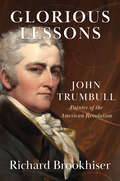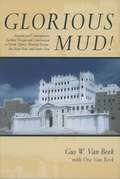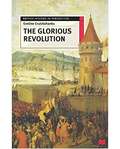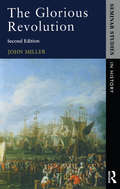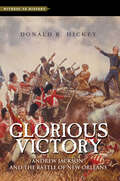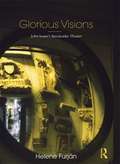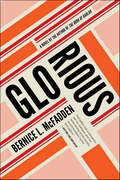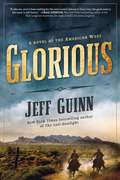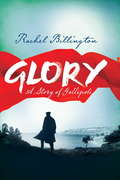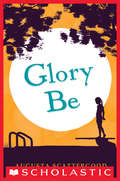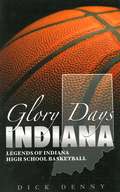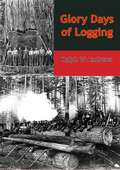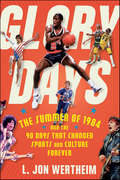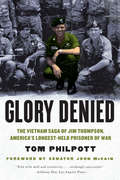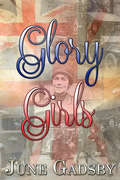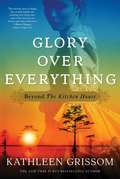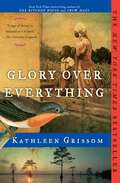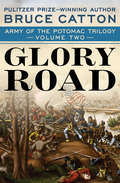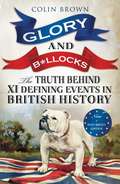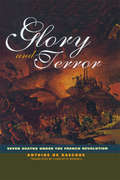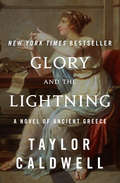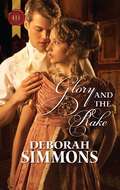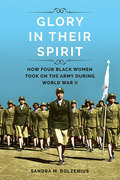- Table View
- List View
Glorious Lessons: John Trumbull, Painter of the American Revolution
by Richard BrookhiserThe complicated life and legacy of John Trumbull, whose paintings portrayed both the struggle and the principles that distinguished America&’s founding moment &“Succinct, both scholarly and direct. . . . Wonderful art history.&”—Brian T. Allen, National Review John Trumbull (1756–1843) experienced the American Revolution firsthand—he served as aid to George Washington and Horatio Gates, was shot at, and was jailed as a spy. He made it his mission to record the war, giving visual form to what most citizens of the new United States thought: that they had brought into the world a great and unprecedented political experiment. His purpose, he wrote, was &“to preserve and diffuse the memory of the noblest series of actions which have ever presented themselves in the history of man.&” Although Trumbull&’s contemporaries viewed him as a painter, Trumbull thought of himself as a historian. Richard Brookhiser tells Trumbull&’s story of acclaim and recognition, a story complicated by provincialism, war, a messy personal life, and, ultimately, changing fashion. He shows how the artist&’s fifty-year project embodied the meaning of American exceptionalism and played a key role in defining the values of the new country. Trumbull depicted the story of self-rule in the modern world—a story as important and as contested today as it was 250 years ago.
Glorious Mud!: Ancient and Contemporary Earthen Design and Construction in North Africa, Western Europe, the Near East, and Southwest Asia (Smithsonian Contributions to Knowledge)
by Ora Van Beek Gus W. Van BeekInvented about 13,000 years ago, mud architecture has since been one of the most common, economical, useful, and widespread forms of building. It has been--and is still being--used for grand palaces and temples as well as simple shops and homes. Research conducted over the last several decades has enabled archaeologists and architects to understand how now-ruined, ancient mud structures were originally built. Gus and Ora Van Beek describe mud-construction techniques from Southwest Asia, the Near East, North Africa, Europe, and the United States, paying specific attention to problems involving foundations, wall and roof construction, cooling and heating, water erosion, and earthquake damage. Glorious Mud! is not only the definitive reference work on one of the world's most important forms of architecture but also a powerful study of the human past.
Glorious Revolution (British History in Perspective)
by Eveline CruickshanksThe aim of this book is to set the Glorious Revolution in its religious, political and diplomatic background and examine its consequences for Britain and Europe. Cruickshanks discusses the problems of the reign of James II that led to the invasion of William of Orange in November 1688. The book summarises and interprets the best in the many collections of essays published for the Tercentenary of the Glorious Revolution, as well as works published since. The Whig interpretation of history, the impact of the Revolution on Scotland and Ireland, and conventional wisdom on the constitutional settlement and the Financial Revolution are all reviewed in a new light.
Glorious Revolution, The (Seminar Studies)
by John MillerFirst published in 1983, John Miller's Glorious Revolution established itself as the standard introduction to the subject. It examines the dramatic events themselves and demonstrates the profound impact the Revolution had on subsequent British history. The Second Edition contains a fuller discussion of Scotland and Ireland, the growth of a fiscal-military state and the role of religion and the Revolution.
Glorious Victory: Andrew Jackson and the Battle of New Orleans (Witness to History)
by Donald R. HickeyThe story of the battle that saved New Orleans, made Andrew Jackson a hero for the ages, and shaped the American public memory of the war.Whether or not the United States "won" the war of 1812, two engagements that occurred toward the end of the conflict had an enormous influence on the development of American identity: the successful defenses of the cities of Baltimore and New Orleans. Both engagements bolstered national confidence and spoke to the élan of citizen soldiers and their militia officers. The Battle of New Orleans—perhaps because it punctuated the war, lent itself to frontier mythology, and involved the larger-than-life figure of Andrew Jackson—became especially important in popular memory. In Glorious Victory, leading War of 1812 scholar Donald R. Hickey recounts the New Orleans campaign and Jackson’s key role in the battle.Drawing on a lifetime of research, Hickey tells the story of America’s "forgotten conflict." He explains why the fragile young republic chose to challenge Great Britain, then a global power with a formidable navy. He also recounts the early campaigns of the war—William Hull’s ignominious surrender at Detroit in 1812; Oliver H. Perry’s remarkable victory on Lake Erie; and the demoralizing British raids in the Chesapeake that culminated in the burning of Washington. Tracing Jackson’s emergence as a leader in Tennessee and his extraordinary success as a military commander in the field, Hickey finds in Jackson a bundle of contradictions: an enemy of privilege who belonged to Tennessee’s ruling elite, a slaveholder who welcomed free blacks into his army, an Indian-hater who adopted a native orphan, and a general who lectured his superiors and sometimes ignored their orders while simultaneously demanding unquestioning obedience from his men. Aimed at students and the general public, Glorious Victory will reward readers with a clear understanding of Andrew Jackson’s role in the War of 1812 and his iconic place in the postwar era.
Glorious Visions: John Soane's Spectacular Theater
by Helene FurjánFocusing on the house and museum and its considerable collections of architectural fragments, models, drawings folios and publications, this book is about thirteen Lincoln’s Inn Fields in London, England, built in the early 1800s by the renowned eighteenth-century architect Sir John Soane. The book maps the influences, references, connections, extensions, and productions at play in Soane’s house-museum. The house, still a public museum, was highly original in its period, and it continues to influence and impress architects and historians alike. Today’s visitor is confronted by a dense, complex series of spaces, a strange accumulation of rooms, objects and effects. This book examines the ways in which Soane enlisted light, shadow, color, fiction and narrative, vistas, spatial complexity, the fragment, and the mirror to produce a spectacular space.
Glorious: A Novel
by Bernice L. McFaddenAward-winning novelist Bernice McFadden's highly anticipated new historical novel set amidst the Harlem Renaissance.—Glorious was a finalist for the 2011 NAACP Image Award for Fiction.“McFadden’s lively and loving rendering of New York hews closely to the jazz-inflected city of myth. . . . McFadden has a wonderful ear for dialogue, and her entertaining prose equally accommodates humor and pathos.” —New York Times Book Review “Bernice L. McFadden’s novel Glorious, which starts with a bang-up prologue, has a strong main character (based in part on Zora Neale Hurston), hard-driving prose, and historic sweep of several decades, including the years of the Harlem Renaissance, which has always fascinated me.” —Jane Ciabattari, National Book Critics Circle PresidentGlorious is set against the backdrops of the Jim Crow South, the Harlem Renaissance, and the Civil Rights era. Blending fact and fiction, Glorious is the story of Easter Venetta Bartlett, a fictional Harlem Renaissance writer whose tumultuous path to success, ruin, and ultimately revival offers a candid and true portrait of the American experience in all its beauty and cruelty. It is a novel informed by the question that is the title of Langston Hughes’s famous poem Harlem: "What happens to a dream deferred?" Based on years of research, this heart-wrenching fictional account is given added resonance by factual events coupled with real and imagined larger-than-life characters. Glorious is an audacious exploration into the nature of self-hatred, love, possession, ego, betrayal, and, finally, redemption.
Glorious: A Novel of the American West
by Jeff GuinnNew York Times-bestselling author of The Last Gunfight, Jeff Guinn turns his eye for evocative detail and history to a sweeping novel of the Old West, weaving a compelling tale of life in the Arizona Territory in 1872.<P><P>We've all got mistakes in our past we'd rather forget.Cash McLendon has always had an instinct for self-preservation, one that was honed by an impoverished childhood and life with an alcoholic father barely scraping by on the streets of Saint Louis in 1872. He's always had a knack for finding and capitalizing on the slightest opportunities, choosing the path of financial security over happiness or real friends. He eventually builds himself up from a Saint Louis street urchin to the son-in-law and heir apparent to industrial mogul Rupert Douglass. Though it lacks passion, his life seems securely set: a wife, a career, property, standing.But when tragedy strikes, all of his plans and his entire future dissolve in an instant. McLendon's instinct for survival kicks in; he flees Saint Louis, and Douglas assigns his enforcer, an ominous skull-cracker with steel-toed boots, to track him down.With nothing to lose, McLendon attempts to reconcile with an old flame--a woman he was nearly engaged to but put aside in exchange for the life now in shambles. He heard through the grapevine that she and her father moved their dry-goods store out west, to a speck-on-the-map mining town named Glorious, in the Arizona Territory. There, McLendon tries to win her back, and in the process discovers a new way of life at the edge of the final American frontier. But he can't outrun his past forever. . . .
Glory
by Rachel Billington'I wonder who chose the word 'glory',' murmured Arthur. 'You mean there's nothing very glorious about war.' The Major smiled. 'People expect words like glory. I do myself.' 'Oh, I'm not against it. There were glorious deeds performed.' Glory is the story of the men and women of Gallipoli and the tragic events of 1915. Of the lives lost, the hearts broken, the decisions cast, the errors made and of the dark reality of the heroic dream. It is the story of three people, changed forever, as the echoes of war ring loud through the years.
Glory Be
by Augusta ScattergoodA Mississippi town in 1964 gets riled when tempers flare at the segregated public pool.As much as Gloriana June Hemphill, or Glory as everyone knows her, wants to turn twelve, there are times when Glory wishes she could turn back the clock a year. Jesslyn, her sister and former confidante, no longer has the time of day for her now that she'll be entering high school. Then there's her best friend, Frankie. Things have always been so easy with Frankie, and now suddenly they aren't. Maybe it's the new girl from the North that's got everyone out of sorts. Or maybe it's the debate about whether or not the town should keep the segregated public pool open. Augusta Scattergood has drawn on real-life events to create a memorable novel about family, friendship, and choices that aren't always easy.
Glory Days Indiana: Legends of Indiana High School Basketball
by Dick DennyBasketball talent in Indiana is probably no better than that found in any other state, yet the richness of tradition is unequalled anywhere else in the country. Author Dick Denny explores the Indiana basketball culture through this wonderful presentation of interviews and stories with IndianaÂ's greatest male high school basketball stars. These legends include Carl Erskine, Monte Towe, and George McGinnis. Each former Indiana basketballer provides warm recounts of his athletic career, his contribution to the history of Indiana basketball, and how his experiences affected him later in life. This book will help you remember your favorite stars from the past, and introduce you to the ones of the present.
Glory Days of Logging
by Ralph W Andrews"Glory Days of Logging" by Ralph W. Andrews is a fascinating visual and historical journey into the heyday of the logging industry in the Pacific Northwest. First published in 1956, this book captures the spirit and grit of the loggers and lumberjacks who played a crucial role in shaping the American frontier.Andrews' narrative is rich with anecdotes and detailed accounts of the logging operations, from the felling of giant trees to the transportation of massive logs using steam donkeys, locomotives, and river drives. He delves into the daily lives of the loggers, exploring their camaraderie, hardships, and the dangerous, often heroic, nature of their work. The book also highlights the technological advancements and innovations that revolutionized the industry.The heart of "Glory Days of Logging" lies in its striking photographs. Andrews' carefully curated images provide a vivid visual record of the era, showcasing towering timber, sprawling logging camps, and the powerful machines that made large-scale logging possible. These photographs, combined with Andrews' informative captions and engaging prose, offer a comprehensive and immersive experience."Glory Days of Logging" is more than just a historical account; it is a tribute to the resilience and ingenuity of the logging communities. Andrews' work stands as an essential resource for anyone interested in the history of American industry, the development of the Pacific Northwest, or the enduring legacy of the logging profession.Whether you are a history buff, a photography enthusiast, or someone with a general interest in America's industrial past, "Glory Days of Logging" offers a captivating and informative read that brings a bygone era to life with authenticity and respect.
Glory Days: The Summer of 1984 and the 90 Days That Changed Sports and Culture Forever
by L. Jon WertheimA rollicking guided tour of one extraordinary summer, when some of the most pivotal and freakishly coincidental stories all collided and changed the way we think about modern sports The summer of 1984 was a watershed moment in the birth of modern sports when the nation watched Michael Jordan grow from college basketball player to professional athlete and star. That summer also saw ESPN&’s rise to media dominance as the country&’s premier sports network and the first modern, commercialized, profitable Olympics. Magic Johnson and Larry Bird&’s rivalry raged, Martina Navratilova and John McEnroe reigned in tennis, and Hulk Hogan and Vince McMahon made pro wrestling a business, while Donald Trump pierced the national consciousness as a pro football team owner. It was an awakening in the sports world, a moment when sports began to morph into the market-savvy, sensationalized, moneyed, controversial, and wildly popular arena we know today. In the tradition of Bill Bryson&’s One Summer: America, 1927, L. Jon Wertheim captures these 90 seminal days against the backdrop of the nostalgia-soaked 1980s, to show that this was the year we collectively traded in our ratty Converses for a pair of sleek, heavily branded, ingeniously marketed Nikes. This was the year that sports went big-time.
Glory Denied: The Vietnam Saga of Jim Thompson, America's Longest-Held Prisoner of War
by John Mccain Tom PhilpottNow hailed as a classic, one of the most unforgettable and heartbreaking books ever written about the Vietnam War. Glory Denied--the harrowing story of America's longest-held POW, the wrenching agonies faced by his family, and the larger story of a nation divided--returns to Norton a decade after its much-heralded publication. Excerpted in The New Yorker and later made into an opera, it is the heroic story of Floyd "Jim" Thompson, captured in March 1964, who became the longest-held prisoner of war in American history. Tom Philpott juxtaposes Thompson's capture, torture, and multiple escape attempts with the trials of his young wife, Alyce, who, feeling trapped, made choices that forever tied her fate to the war she despised. "One of the most honest books ever written about Vietnam" (Oliver Stone), Glory Denied demands that we rethink the definition of a true American hero.
Glory Girls
by June GadsbyMary, Anne, Iris and tough little Effie form a formidable group when, in 1939, they join the FANYs, or more precisely the First Aid Nursing Yeomanry, euphemistically calling themselves 'The Glory Girls'. However, the glory they dreamed of is short-lived as their unit moves from the London blitz to occupied France. Forbidden love, betrayal and tragedy stalk them and as their personal courage is tried - and sometimes found lacking - survival seems to depend largely on luck. This is especially so for Mary. As a Special Operations Executive, and with very little training, she is sent behind enemy lines in a desperate attempt to save the lives of men in a safe house under Nazi threat. And now her only contact has been murdered by the Gestapo...
Glory Over Everything: Beyond The Kitchen House
by Kathleen GrissomJamie Pyke, son of both a slave and master of Tall Oakes, has a deadly secret that compels him to take a treacherous journey through the Underground Railroad. Published in 2010, The Kitchen House became a grassroots bestseller. Fans connected so deeply to the book’s characters that the author, Kathleen Grissom, found herself being asked over and over “what happens next?” The wait is finally over.
Glory Over Everything: Beyond The Kitchen House
by Kathleen GrissomThe latest New York Times bestseller from the author of the beloved book club favorite The Kitchen House is a heart racing story about a man’s treacherous journey through the twists and turns of the Underground Railroad on a mission to save the boy he swore to protect. Glory Over Everything is “gripping…breathless until the end” (Kirkus Reviews).The year is 1830 and Jamie Pyke, a celebrated silversmith and notorious ladies’ man, is keeping a deadly secret. Passing as a wealthy white aristocrat in Philadelphian society, Jamie is now living a life he could never have imagined years before when he was a runaway slave, son of a southern black slave and her master. But Jamie’s carefully constructed world is threatened when he discovers that his married socialite lover, Caroline, is pregnant and his beloved servant Pan, to whose father Jamie owes his own freedom, has been captured and sold into slavery in the South. Fleeing the consequences of his deceptions, Jamie embarks on a trip to a North Carolina plantation to save Pan from the life he himself barely escaped as a boy. With the help of a fearless slave, Sukey, who has taken the terrified young boy under her wing, Jamie navigates their way, racing against time and their ruthless pursuers through the Virginia backwoods, the Underground Railroad, and the treacherous Great Dismal Swamp. “Kathleen Grissom is a first-rate storyteller…she observes with an unwavering but kind eye, and she bestows upon the reader, amid terrible secrets and sin, a gift of mercy: the belief that hope can triumph over hell” (Richmond Times Dispatch). Glory Over Everything is an emotionally rewarding and epic novel “filled with romance, villains, violence, courage, compassion…and suspense.” (Florida Courier).
Glory Road: The Bloody Route From Fredericksburg To Gettysburg (Army of the Potomac Trilogy #2)
by Bruce CattonThe riveting saga of a nation at war with itself--from the Union Army's disaster at Fredericksburg to its costly triumph at Gettysburg--by Pulitzer Prize-winning Civil War chronicler Bruce Catton In the second book of the Army of the Potomac Trilogy, Bruce Catton--one of America's most honored Civil War historians--once again brings the great battles and the men who fought them to breathtaking life. As the War Between the States moved through its second bloody year, General Ambrose Burnside was selected by President Lincoln to replace the ineffectual George "Little Mac" McClellan as commander of the Union Army. But the hope that greeted Burnside's ascension was quickly dashed in December 1862 in the wake of his devastating defeat at Fredericksburg. Following Burnside's exit, a mediocre new commander, Joseph "Fighting Joe" Hooker, turned a sure victory into tragedy at Chancellorsville, continuing the Union's woes and ensuring Robert E. Lee's greatest triumph of the war. But the tide began to turn over the course of three days in July 1863, when the Union won a decisive victory on the battlefield of Gettysburg. Months later, Lincoln would give his historic address on this ground, honoring the fallen soldiers and strengthening the Union Army's resolve to fight for a united and equal nation for all of its people. With brilliant insight, color, and detail, Catton interweaves thrilling narratives of combat with remarkable portrayals of politics and life on the home front. Glory Road is a sweeping account of extraordinary bravery and shocking incompetence during what were arguably the war's darkest days.
Glory and B*llocks: The Truth Behind Ten Defining Events in British History – And the Half-truths, Lies, Mistakes and What We Really Just Don’t Know About Brexit
by Colin BrownWas the technologically sophisticated longbow responsible for the landmark victory at Agincourt, or was it simply that the English are better in mud? When did Queen Elizabeth I learn that the Armada had capitulated - before or after she delivered one of history's most inspiring and self-serving speeches? Why did Wellington meet his Waterloo on his return to London? Acclaimed author and political reporter Colin Brown travels to the places where history was made to uncover the real story.
Glory and Hope: Inaugural Speech May 10, 1994
by Nelson MandelaSummary: "Glory and Hope" By Nelson Mandela "Glory and Hope" was Nelson Mandela's 1994 inaugural speech as the first democratically elected State President of South Africa. At the time, South Africa was in a rough transition from a system of Apartheid with segregation of people based on race and class divisions to a system with renewed hope for equality to all of their citizens. As the first democratically elected State President of South Africa, Nelson Mandela planned to ease the transition, giving the Africans a sense of pride and security; this speech is the first example of his effort. Reading this speech, the reader encounters lines that tell of pride, passion, and devotion. They realize that Nelson Mandela wrote the speech with his heart rather than with his mind. After tough times, Mandela is not ashamed of his land and believes that with hard work and patience from the citizens of South Africa, they can "reinforce humanity's belief in justice, strengthen its confidence in the nobility of the human soul and sustain all hopes of a glorious life for all,"(Glory and Hope by Nelson Mandela).
Glory and Terror: Seven Deaths Under the French Revolution
by Antoine de BaecqueFirst published in 2003. Routledge is an imprint of Taylor & Francis, an informa company.
Glory and the Lightning
by Taylor CaldwellLike Romeo and Juliet, and Tristan and Isolde, there was Pericles and Aspasia. Set in ancient Persia and Greece, this novel is based on the life of Aspasia, the beautiful and intelligent courtesan who eventually became the companion of Pericles, ruler of Athens. Follow their paths, starting from their lives apart until they meet and become star-crossed lovers. It's a love story that has endured for millennia.
Glory and the Lightning: A Novel of Ancient Greece
by Taylor CaldwellNew York Times Bestseller: A breathtaking saga of ancient Greece and one of history&’s most influential political couples, Aspasia and Pericles. Born in the Greek city of Miletus, Aspasia was destined for a life of tragedy. Her wealthy father vowed to abandon any female child, so Aspasia was secreted away, educated independently of her family, and raised as a courtesan. She discovered at an early age how to use her powers of intellect as ingeniously as those of the flesh. Ensconced in the Persian harems of Al Taliph, she meets the man who will change her fate: Pericles, the formidable political leader, statesman, ruler of Athens, and Aspasia&’s most cherished lover. She becomes his trusted confidante, his equal through scandal, war, and revolt. From the eruption of the Peloponnesian War to violent political and family rivalries to a devastating plague, author Taylor Caldwell plunges the reader into the heart of ancient Athens. In bringing to life the tumultuous love affairs and gripping power struggles of one of history&’s most complicated and fascinating women, Glory and the Lightning is thrilling proof that &“Caldwell never falters when it comes to storytelling&” (Publishers Weekly). This ebook features an illustrated biography of Taylor Caldwell including rare images from the author&’s estate.
Glory and the Rake
by Deborah SimmonsMiss Glory Sutton has two annoyances in her life. One: the precious spa she's determined to renovate keeps getting damaged by vandals. Two: Oberon, the arrogant Duke of Westfield-the man assigned to help her find the perpetrators.Oberon has no interest in this independent, troublesome woman! And Glory couldn't be less interested in the enigmatic rogue!As they get drawn deeper into the mysteries of the spa, they too must reveal their secrets in order to uncover the truth. And then, perhaps, the legend of the waters will come true!
Glory in Their Spirit: How Four Black Women Took On the Army during World War II (Women in American History)
by Sandra M BolzeniusBefore Rosa Parks and the March on Washington, four African American women risked their careers and freedom to defy the United States Army over segregation. Women Army Corps (WAC) privates Mary Green, Anna Morrison, Johnnie Murphy, and Alice Young enlisted to serve their country, improve their lives, and claim the privileges of citizenship long denied them. Promised a chance at training and skilled positions, they saw white WACs assigned to those better jobs and found themselves relegated to work as orderlies. In 1945, their strike alongside fifty other WACs captured the nation's attention and ignited passionate debates on racism, women in the military, and patriotism. Glory in Their Spirit presents the powerful story of their persistence and the public uproar that ensued. Newspapers chose sides. Civil rights activists coalesced to wield a new power. The military, meanwhile, found itself increasingly unable to justify its policies. In the end, Green, Morrison, Murphy, and Young chose court-martial over a return to menial duties. But their courage pushed the segregated military to the breaking point ”and helped steer one of American's most powerful institutions onto a new road toward progress and justice.
